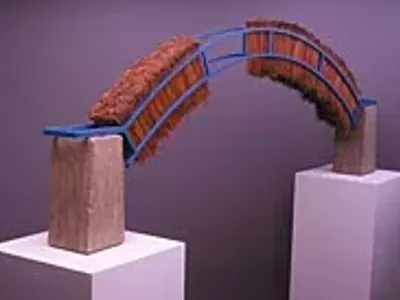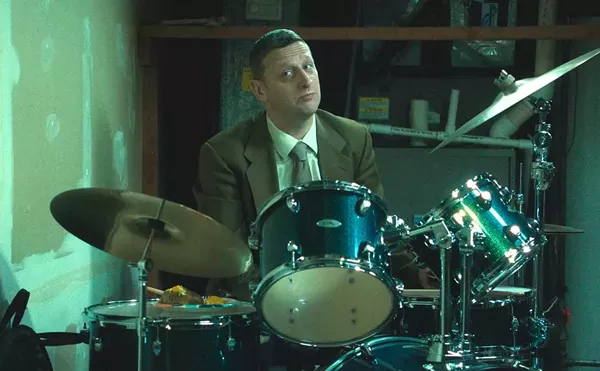
Audio By Carbonatix
[
{
"name": "GPT - Leaderboard - Inline - Content",
"component": "35519556",
"insertPoint": "5th",
"startingPoint": "3",
"requiredCountToDisplay": "3",
"maxInsertions": 100,
"adList": [
{
"adPreset": "LeaderboardInline"
}
]
}
]
Go to a Saturday night concert at the Senate Theatre on Michigan Avenue in Detroit and you’ll see a very white, largely AARP-eligible, committed crowd of pipe organ fans — the kind of folks you don’t expect to see in the inner city after dark.
The Detroit Theater Organ Society, along with a one-of-a-kind Wurlitzer pipe organ, has been housed in the Senate since the 1960s. Built to accompany silent movies, the organ is an orchestra unto itself, able to replicate the sounds of instruments ranging from strings, brass and woodwinds to the glockenspiel and xylophone.
The society sponsors monthly concerts featuring nationally known organists. But the 75-year-old organ and the 160-member group are looking to move out of Detroit.
It is yet another chapter in the old debate about whether Detroit’s historic objects and institutions can remain in the city.
Those in favor of moving feel they could attract newer, younger members and concertgoers if the organ weren’t located in a Detroit neighborhood that has seen better days.
“With the part of town that it’s in, people come once and don’t come back again,” said DTOS president Dick Leichtamer.
“We feel our membership is on its way to zero,” former president George Orbits said about the club which once featured as many as 400 members. “The people just do not want to come to Detroit.”
While he is adamant about moving, Orbits would rather keep it quiet.
“I’m worried about the publicity this could generate,” he said. “I’m concerned that it will generate bad feelings in the neighborhood.”
It is a neighborhood society vice president Edward Walsh knows well. His grandparents’ former home still stands on Livernois, blocks away from the theater.
“I’m probably on the fence (about the move),” he admitted. “I like the building and the way the organ sounds in it, and there’s some emotional attachment.”
A former church musician, Walsh once played the Senate’s Wurlitzer in concert while a child. But he is part of the committee scouting out a new location.
“If it’s something that will keep the organization alive, then it is a positive thing,” he said.
Then there are those who don’t want to move the organ — and not only because it weighs 32 tons and features 2,380 pipes ranging from pencil-sized to 16 feet long. Tom Lewandowski, an electrician who managed the theater for 20 years, sees the current location as ideal for the instrument.
“The organ will never again be in a theater setting like it is now,” he said.
Built in 1926, the theater was purchased by the then-fledgling organ society in a 1961 tax sale. A flooded, decrepit shell of its former self, the theater was rescued by the muscle, sweat and cash of club members. Orbits had purchased the organ, which had done stints in the Fisher Building and the long-gone Iris Theater, and sold it to the group, turning the building into a showplace for the instrument, which is among the largest of its type in the country.
Since then, the theater has hosted organ concerts, along with a few other events.
So far, the club has looked at an old gym and other buildings. At one point, the group considered moving into the old Ford Auditorium, which sits empty near the city’s riverfront.
“The city told us that it is slated for demolition,” said Walsh. “It would be great if we could convince them to let us have it, but getting through to the city is virtually impossible.”
In any case, a move might create more problems than it solves.
“Once the organ is taken out, it will be out of commission for a year or two years because it will take that long for it to be set up again,” said current Senate Theatre manager Jim Casterson.
“It’s not just having a piano mover come in with a cart,” explained Walsh, who is also an electrical engineer. “There’s the pipes, the blower, electrical systems. The organ can’t be installed as it is. The wiring and relay systems will have to be replaced.”
The hope is all that will be worthwhile once the organ relocates to a suburban building that will double as a rentable hall for weddings and other events.
The society is also having problems that moving will not necessarily solve. For one thing, interest in organ music is waning, with the current fan base aging and dying off.
“I don’t think theater organ music has ever been wildly popular,” said Walsh. “It’s not like a Madonna or Jennifer Lopez class of entertainment.”
Most agree that moving the organ and the organization will not necessarily solve those problems. And, despite the fears of crime that they cite as a reason for the move, DTOS board members admit that they don’t recall any serious negative incidents involving concertgoers.
Nevertheless, among those opposing the move, there is a kind of fatalistic reluctance to fight it too hard. Relocating Detroit institutions to the suburbs is a well-established tradition, even among post-white-flight diehards, many of whom now feel that Detroit’s renaissance is too little, too late.
The Senate Theatre is at 6424 Michigan Ave. (near Livernois) in Detroit. Visit theatreorgans.com/mi/dtos for more information.
Leah Samuel is a Detroit-based writer. E-mail letters@metrotimes.com




